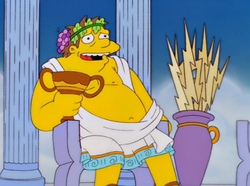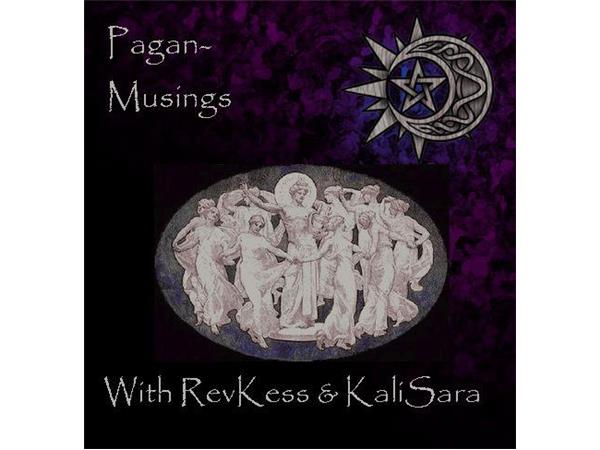I am a Jungian Neo-Pagan, which means that, theologically speaking, I fall somewhere between atheist Pagans and devotional polytheists regarding the existence of the gods. By placing my beliefs in the “middle” here I do not mean to privilege my beliefs, only to make the point that I both agree and disagree with both groups about different things. One thing I agree with devotional polytheists about is that the gods should be taken seriously. One thing I disagree with many of them about is that they can necessarily be trusted.*
Taking the gods seriously
I worry sometimes that we Neo-Pagans don’t take our own gods seriously enough. While I may disagree with devotional polytheists about the metaphysical nature of the gods (whether they are “real, independent, sentient beings” or real, independent semi-conscious archetypes), one thing I admire about them is the seriousness (the “piety” if you will) with which they approach the gods. Ronald Hutton has noted that one of the distinguishing features of Neo-Pagan witchcraft is the “consecration of play”. As the Charge of the Goddess affirms, “mirth and reverence” both play an important role in Neo-Paganism. This is an admirable corrective to the dreary seriousness of much of Christian liturgy. But there is a time and place for all things, and sometimes it seems that our revelry trivializes our religion.
More to the point, sometimes we Neo-Pagans trivialize our gods. We do this with a lot of our art — consider how, in Pagan art on the Internet, the goddesses look like Barbie dolls or comic book superheroines. Barbara Ardinger’s Finding New Goddesses: Reclaiming Playfulness in Our Spiritual Lives is another good example of the trivialization of the gods. While Ardinger’s book was perhaps intended as a parody, there is more than a kernel of truthfulness in her characterization of Neo-Pagans worshiping “found gods” like “Spendifera (spen-DIF-er-uh) Goddess of the Mall”. And then there is the eclectic Neo-Pagan practice of “using gods” like tools, which has been called “plug and play gods” and “the god faucet”. These trivializations of the encounter with the divine have encouraged a kind of backlash in our community, helping in part to fuel the growth of devotional polytheism — which I see as a much needed balance to the excesses of an eclectic and playful Neo-Paganism. The desire to take the gods seriously is, I think, much of what fueled one side of the Superhero debate in the Pagan blogosphere last year and the more recent discussion which was sparked by Morpheus Ravenna’s post on how ritual might be different if we took the gods more seriously.
Are the gods worthy of worship?
But as much as I am concerned about the trivialization of the gods, as a Jungian Neo-Pagan*, I am also concerned when it is assumed that the gods are benign. Uncritical trust can be a form of disrespect too. The word “worship” derives from the Old English word for “worthy”. I wonder then, why have I rarely seen the question asked whether the Pagan gods are worthy of worship. To put it another way, why should we assume the gods can be trusted? When I have asked the question of devotional polytheists in the past, it is often heard as a nonsensical. I have been met with responses ranging from “Because I have faith they can be trusted” to “Because they can rip your arms off and beat you with them”. The first echoes of monotheism for me, and the second is a non-sequitur (as well as counterfactual). John Beckett has written about the gods as paragons of virtue. But are they not also paragons of vice? I concur with John Opsopaus that “The Gods Are Not Moral Ideals”. The polytheistic gods, as I understand them, are not necessarily good and they are not omni-benevolent. If the myths are to be believed on any level, the gods are just as flawed as human beings — they just have more power. Why bow down to power, if it is not paired with virtue?


One answer perhaps is that the gods should be worshiped because they are — just as nature can be worshiped because it is. Worship (or reverence, if you prefer) is the natural human response to nature. Nature is not moral or virtuous, and I have no reservations about worshiping it. But worshiping something and trusting it are two different things. I don’t ever assume that nature is benign or trustworthy. Why should we assume the gods are trustworthy? Worshiping them, I understand. But trusting them? I suspect that for some devotional polytheists, this trust is built through experience, creating relationships with the gods (what I think Hellenics call kharis). But, in my experiences, as a Jungian Neo-Pagan*, the gods are anything but trustworthy.
The role of capricious gods in a consent culture
Galina Krasskova writes that Dionysus and her own god, Odin, can be cruel, brutal, savage, even sadistic, and can even “violate consent”. Consent is a core value for most Pagans, I think. Do we have space in our pantheons for gods who violate consent? Many of us worship nature even though nature does not respect consent. Why should the gods be any different? The Cambridge ritualist, Gilbert Murray, wrote the following about Euripides’ Dionysus:
“There are in the world things not of reason, but both below and above it; causes of emotion, which we cannot express, which we tend to worship, which we feel, perhaps, to be the precious elements in life. These things are Gods or forms of God: not fabulous immortal men, but ‘Things which Are,’ things utterly non-human and non-moral, which bring man bliss or tear his life to shreds without a break in their own serenity.”
It’s easy to see how gods like Dionysus and Odin fit this description, but I think it potentially applies to all the gods. Take Aphrodite, for example, the so-called “goddess of love”, perhaps one of the most trivialized pagan goddesses in mainstream culture. But in the myths, she was was responsible for the doom of dozens of mortals and gods who crossed her. One thing that I take away from the myths is that the gods are just as likely to bring doom as they are to bring a boon.
Christine Downing, author of Gods in our Midst and The Goddess: Mythological Images of the Feminine, describes the gods as the “immortal, permanent, ineluctable aspects of the world.” I think that definition could apply to the gods of devotional polytheists, as well as Neo-Pagan gods. Whether we call them “gods”, “archetypes”, “forces of nature”, “immensities”, or “things which are”, it seems to me that they should be respected — but not trusted. Respected, not the way Christians respect their benevolent father-god, but more like the way the ancient henotheistic Israelites respected Yahweh, who could be cruel and capricious. (Remember the story of Uzzah, who was struck down when he touched the ark of the covenant to steady it when the oxen carrying it stumbled in 2 Samuel 6?) Yahweh was like a terrible force of nature that could kill indiscriminately (as well as a nurturing mother).
This is not to say that the gods should always be feared. I can revel in a thunderstorm, and still respect it. I agree with John Beckett, when he writes that “we can trust the gods to be who and what they are”— not to answer all our prayers, not to have our best interest in mind, but “we can trust the gods to be the gods.” I agree, but I don’t think that’s saying very much. I trust a thunderstorm to be a thunderstorm or the ocean to be the ocean, which is to say, I don’t trust either much at all. But I still respect them and reverence their beauty and power.
How serious am I?
“Isn’t this all just hyperbole or metaphor, John?”, you might ask. If a person like me believes the gods are natural forces or psychological archetypes, why does it matter if I respect them? If the gods don’t grant us divine boons, what is the point of piety? I would argue that respect is still the appropriate attitude for natural forces and psychological archetypes If I don’t respect the lightning storm or the ocean, they can kill. Attitudes determine actions. And an impious attitude toward nature can get me killed. If I treat the ocean like it is only the benevolent sheltering womb of the Goddess, then I overlook its dangers, the hidden undertow, the lurking predators. The ocean may not intend to kill me, but I would still be just as dead.
And what about archetypes? Carl Jung called the archetypes “gods” and compared the psyche to an “Olympus full of deities who want to be propitiated, served, feared and worshipped”. How can the archetypes be dangerous? They are dangerous if I assume they are benevolent. Consider if I treat Aphrodite as merely a saccharine goddess of “love”, if I confuse Aphrodite Pandemos (lust) for Aphrodite Ourania (universal love). Would that not wreak havoc on my personal life? Or what if I treat the intoxicating power of Dionysus — in the form of drugs, alcohol, or sex — as an unequivocal good? Or take the Morrigan, the goddess of sovereignty, who seems to be drawing many followers to her in recent years. Often this worship seems to take take the form of an expression of personal sovereignty. But a one-sided worship of personal sovereignty can undermine the connections that create community, something we Pagans need to be especially aware of, I think. (Remember that sovereignty in Celtic myth meant, not independence, but a special kind relationship with one’s community and the land.)
Only pantheon is worthy of worship
And the gods can also be dangerous when they are not balanced with each other. What happens if Dionysus’ ecstasy is not balanced by the tempering influence of Apollo’s cool rationality? Or if Odin’s berzerker rage is not mitigated by the grounding influence of Frigga? Will not these archetypal power tear my life to shreds “without a break in their own serenity”, as Murray writes?
This is one thing that Paganism has taught me about my former faith, Christianity: The problem with Yahweh wasn’t so much that he was a bad god; it was that he thought he was the only god. Protestantism of the kind that I practiced (Mormonism, specifically) had done away with the Trinity, the saints, and the Theotokos, not to mention the spirits of nature — leaving only the jealous God who will have no others beside him. (Sure, Mormons believe in a Heavenly Mother, but she has no name, cannot be prayed to, and is only mentioned in whispers.) Paganism, especially Jungian Neo-Paganism, taught me that it is better to be whole than to be good — if to be “good” means to be one-sided.
In this sense, it is only the gods in their plurality that are worthy of worship, not any individual god. To put it another way, it is only the pantheon, not the gods, that can be trusted. Christine Downing writes, “At the very heart of polytheism lies the conviction that only the totality of the gods and goddesses constitutes the divine world. … There are many myths that reveal how fatal it is for us humans to overlook even one, to fail to give each his or her due honor.” For us to disregard any one of the gods, she goes on “is to curtail the richness of the world and the fullness of the human.”
Of course, I can’t worship all the gods all the time. I can’t even worship all the gods of one pantheon all the time. But I can be aware, as my attention is drawn to one god in particular for a while, that any deity exists in a sacred context — a pantheon — that includes other balancing powers. I can remember this in deed this by honoring different gods during different seasons or different times of the day. I can do this by honoring in my rituals those ADF druids call “the Outsiders” and what the Greeks called Agnostos Theos, the unknown god. I can do this by celebrating the fact that every god has his or her shadow — even the most seemingly benign.
Pagan priesthood and laity
Of course, there will always be those who are called to be priests and priestesses (or even godspouses), devoted exclusively to one god or another. But perhaps such individuals should be approached with the same reservation and caution with which we approach the gods. Emerson is believed to have said,
“The gods we worship write their names on our faces, be sure of that. … Therefore it behooves us to be careful what we are worshiping, for what we are worshiping we are becoming.”
Odin devotee, Galina Krasskova, seems to suggest as much when she writes: “Falling into Gods like Odin, and like Dionysos … carries with it the potential for finding those elements of the Gods’ nature in ourselves, for becoming in however small or large a way, transformed by Them, by the contact, transformed into becoming a bit more like Them in outlook.” What does this mean when your god is a “savage god”? I imagine this can be a good thing, just as there is such a thing as righteous anger — but it is not an unmitigated good. An exclusive worship of one deity can be pathological. Consider this example, from a certain priest of Dionysus:
“In the spirit of Savonarola and Charles Manson
I think the cult of celebrity is destroying Paganism
so I’m going to transform myself into a Pagan celebrity.That’s right. I’m gonna get my nasty clown c*ck all up in that sh*t
so that the whole institution ends looking gross and absurd
and people will have no choice but to flee internet communities
and return to the solace of their shrines, just them and their gods
and never another thought given to what authorities think.To kill what you hate, you must become it.
It ain’t gonna be easy. I’m going to have to stir up a lot of drama.
Innocent people will get burned.
But they brought it on themselves. You make yourself a sheep,
you’re pretty much asking to get fleeced. …”
Fortunately, not all Pagan priests identify so completely with the object of their devotion, and not all deities are as destructive as Dionysus. But, as a Jungian Neo-Pagan*, I think the danger is always there in focusing exclusively on one god or goddess. It seems like there is a fashion in Paganism recently for ever increasing levels of intimacy with individual gods (witness the proliferation of godspouses)– which seems odd in a community which is defined primarily by its polytheism. Priests and priestesses are an essential part of our community, but it’s good, I think, that most of us are not priests (at least not in the traditional sense of the term). A large pagan laity is a good thing, in my mind. A community of true priests, like a community of shamans, would be no community at all — it would be a madhouse.
As for me, I am content that no Pagan god has singled me out. I know what that kind of divine scrutiny is like. I know what it is like to be “possessed” by a god (Yahweh). I experienced it more like a disease than a blessing. And I have learned that the only remedy for it is to open my eyes to discover “a world full of gods”.
[*Note: I do not mean to imply by anything I write here that the experiences of devotional polytheists and Neo-Pagans are necessarily comparable. Oftentimes they are not comparable, as I have learned from discussions with several devotional polytheists. Sometimes they are not entirely incomparable, as I have learned from Joshua Tenpenny’s frank writing about his communication with the gods here and here. Nor do I mean to imply that all Neo-Pagans experience the gods the same way, or that my experience is everyone else’s.]
[Author’s note: Most of the links to devotional polytheists’ blogs have been removed to prevent controversy. If you would like a source for a specific reference, please contact the author.]















